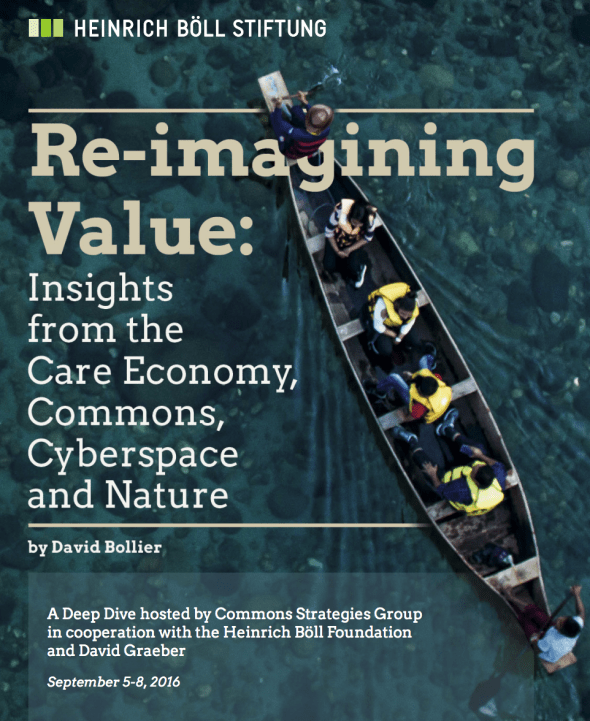re imagining value report
via
john thackara (@johnthackara) tweeted at 12:03 AM – 9 Mar 2017 :
This summary by @davidbollier of a complex but life-critical subject is a work of art in itself https://t.co/dw40w2aUU5 @boell_stiftung https://t.co/BCuXA2OjSI (http://twitter.com/johnthackara/status/839733357797867520?s=17)
john thackara (@johnthackara) tweeted at 6:05 AM – 9 Mar 2017 :
is there *any* escape from the death grip that money has on our thoughts and actions? If you’d like to know, you need to read this (http://twitter.com/johnthackara/status/839824447410417665?s=17)
David Bollier.. David Graeber.. value.. (Michel Bauwens..Andreas Weber..Pedro Jardim..Silke Helfrich.. et al)
notes/quotes/highlights from pdf report:
p3
Value is regarded as a morally neutral attribute that arises from the natural workings of free and independent individual agents. Market champions celebrate
*“exchange value”
that supposedly stems from rational and efficient consumer/seller transactions.
what if once we go from value to *exchange value.. we lose value – 10 day cares et al
perhaps true value is a perception per individual per day per hour.. whatever.. so the idea of exchanging it .. which implies measure\ing it.. makes no sense.. it compromises value.. trying to get some norma value label.. some consensus.. which then oppresses not only the concept of value.. but the people who hold it..
exchanging ness.. transaction ness.. is the thing that’s not natural..
value can’t be compared.. from one thing/time/person/whatever to another.. so exchanges ness.. well..
ie: lots of things.. but one in particular.. mona lisa smile.. what is art.. who decides.. not comparing thins.. 9 to 13 min ish – my mother thought this was brilliant.. i painted it for her bday.. art isn’t art until someone says it is.. it’s art.. the right people.. who are they..
comparing.. value (there is always an s… even w in one thing/person)..so the idea if exchanging value is impossible/irrelevant
flavors ness..always changing.. always seen from diff angles..
In our time, neoliberal economists and policy makers depict value as synonymous with price – an economic category that is said to arise from the workings of “free” and “fair” markets. Anything else that people and societies care about is seen as a mere matter of values – private, personal and beyond the scope of the market-based polity
[..]
Across these groups, there is a growing recognition that there is no consensus theory of value, or at least no globally accepted theory that reflects the whole of life and not just its economic dimensions
as it should be.. no..? ie: flavors ness..
besides perhaps maté basic needs..
p 4
The standard narrative of neoclassical economics continues to hold sway, but its commitment to monetized value – price – as a realistic representation of value is increasingly seen as fanciful at best, if not a *corrupt fiction. Yet** alternative schemas of valuation remain largely underdeveloped or confined to intellectual or political ghettos, at least in the West; they are far more prevalent in nonmodern contexts.
*corrupt fiction – making up money
**no alt – a nother way
[..]
Discussion focused on how to develop alternative approaches for understanding “value(s).” Can we incorporate the importance of care, social labor and the intrinsic value of nature (as opposed to exchange value) into our theories of value?
yes.. ie: hosting-life-bits via self-talk as data.. 7 bn living 2 convos.. (deciding/declaring/choosing curiosity/value et al) everyday .. as the day [aka: not part\ial.. for (blank)’s sake…]
Can we devise a coherent philosophical foundation for understanding how value(s) come into being? Or is the word “value” itself problematic? If not, how might a new theory of value fortify social movements now challenging neoliberalism, especially in political and policy arenas?
1\ the value question
p 6
Graeber, author of the 2001 book, Toward an Anthropological Theory of Value, pointed out that the idea of value speaks to the human condition, and in this sense, it is a starting point for thinking about politics.
[..]
Marx drew upon the ideas of Adam Smith and David Ricardo, who argued that market price reflects the value of human labor needed to acquire or make something.
[..]
Marx focused on commodities and money as a kind of “symbolic analysis in social theory. In essence, Marx was saying that, through a complicated trick we play on ourselves, money becomes an object of desire that we bring into being to provide a representation of the importance of our actions…..The importance of our actions are reflected back at us – through money, heirlooms and other objects – which then seem to be the source of the very things they represent.” This analysis lies at the heart of Marxist value theory, said Graeber, illuminating the social dynamics of human desire
p 7
We regard value as an economic category embodied in price, and values as idiosyncratic social and moral opinions. This split in the meaning of “value” only makes sense, said Graeber, “because we divide the world into production and reproduction, and production and consumption.” Money always appears to be the same in all contexts (indeed, that is why it is considered valuable), whereas values – seen as personal and private – are the exact opposite.
[..]
Marx starts his masterwork Capital by subtly contrasting “wealth” with “commodity.”
[..]
Marx’s definition of wealth from a previous book, the Grundrisse, suggests what he may have had in mind: “the universality of human needs, capacities, pleasures, productive forces, etc., created through universal exchange.”
[..]
In effect, Marx is underscoring that the question of value – how to define “wealth” – lies at the heart of political struggle. David Graeber noted that politics revolves around which of innumerable forms of value should prevail in society: “If politics is a struggle among values, presumably
freedom would be about a community choosing which forms of value it will pursue.
Politics would be about the mechanisms for deciding how resources will be equitably allocated in ways that people want.” But of course, this is precisely the problem: As human beings, we supposedly have free will – and yet we don’t or can’t change how we enact value in the world. This raises a troubling question: If we theoretically have the freedom to “stop making capitalism” by altering our everyday actions and thinking in different ways, why don’t we make another system of value?
p 8
In probing the labor theory of value, Graeber said he discovered a “terrible flaw” in it, at least as applied to advanced capitalism: “The value of labor is seen as producing things,” he said. “But when you stop to think about it, most labor is not about producing something. It’s about maintaining something to keep it the same – as in washing a cup. Or labor is about nurturing something or creating an environment in which something can grow, as in agriculture, rather than constructing something inside a factory.” If labor is more about care and nurturance than “production” as such, Graeber wondered, then perhaps feminists and ecologists have some important insights in helping us come up with an alternative theory of value. After all, they, along with Indigenous peoples, have been living within alternative systems of value for a long time. Graeber found it significant that care workers stuck in low-paying jobs were among the most enthusiastic protesters in the Occupy movement – care workers in the vanguard of protests against finance capitalism. Graeber realized that “socially meaningful labor” that doesn’t produce commodities tends to be penalized by the market system, which has created millions of gratuitous “bullshit jobs.”2 “What sort of value theory can speak to these concerns?” he asked. Graeber has an intuition that any new value theory must speak to the human condition and our propensity for play. “Freedom manifests itself in the play principle,” he said. “One of the constituent principles of the universe is fun – playing around. The question for us is, What forms of mutual dependence enhance our freedom and fun?”
[..]
The labor theory of value points to the deficiencies of modern conceptions of value in our political economy – yet we do not have an adequate alternative theory.
p 9
The issue needs to be addressed because, however much we may wish to move beyond capital and commodity exchange as the ordering principle of society, “the question remains as to what alternative mechanisms or processes may exist to make social decisions.”
huge.. let’s try hosting-life-bits via self-talk as data..completely redefining and opening up decision making .. because public consensus always oppresses someone
[..]
“We cannot do without a value regime,” said Michel Bauwens, founder of the Peer to Peer Foundation and cofounder of the Commons Strategies Group. “Today, we have a dictatorship of one kind of value as delivered by the market system, which determines for everyone how they can live.” Consider how the labor of a nurse is regarded under different value regimes, he said: A nurse working as a paid employee is considered value-creating – a contributor to Gross Domestic Product. But the same nurse doing the same duties as a government employee is seen as “an expense, not a value-creator,” said Bauwens. The same nurse working as a volunteer “produces no value at all” by the logic of the market system.
p 10
Bauwens said that his work in fostering peer production communities is an exploratory project in creating a new type of “value sovereignty” based on mutualism and caring. An important aspect of this work is protecting the respective community’s value sovereignty through defensive accommodations with the market system.
“The peer production system lives a dichotomy,” explained Bauwens. “It is based on contributions for which we don’t get paid. We therefore have to interact with the market so that we can earn a living and get paid for what we have to do.”
Maintaining a peer community within a hostile capitalist order requires that the community “create membranes to capture value from the dominant system, but then to filter it and use it in different ways” – i.e., through collective decision making and social solidarity, not through the market logic of money-based, individual exchange.
so let’s disengage from this.. earn a living ness


















